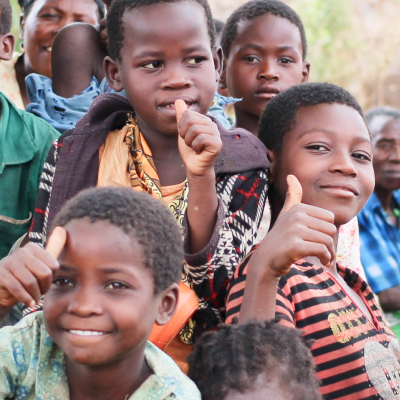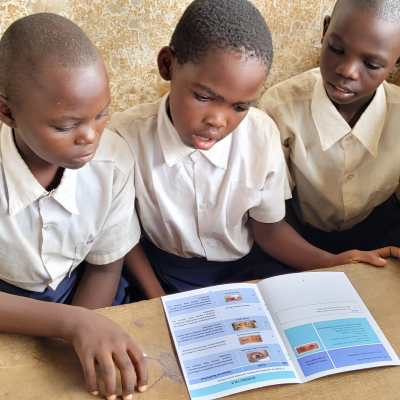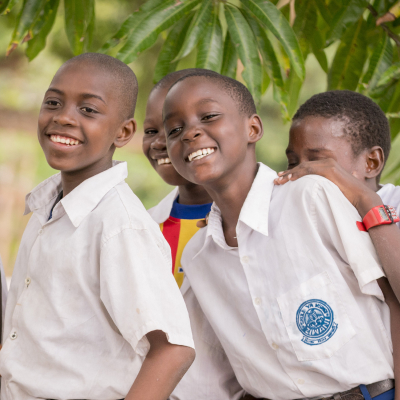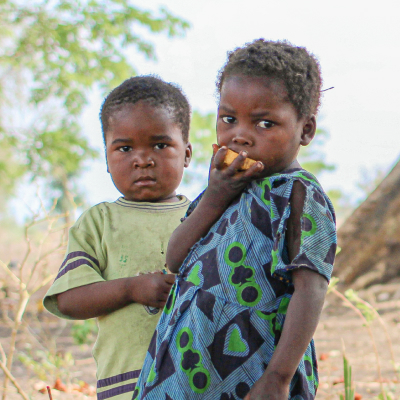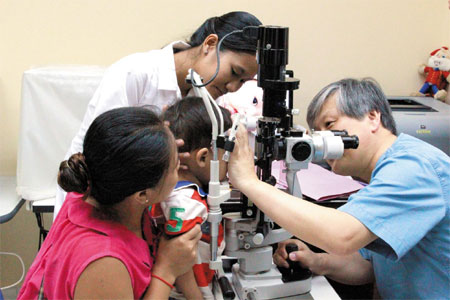Open Your Eyes campaign with Heart to Heart Foundation for blindness prevention
Kuri F&V Co. Ltd., KOICA and Heart to Heart Foundation together completed an eye clinic to prevent pediatric blindness
According to the World Health Organization (WHO), about 285 million people in the world suffer from blindness or low vision. 90% of those with visual impairments are from developing countries, and for 80 percent of them the blindness could have been prevented with proper treatment. But oftentimes, most of them lose their vision because some minor scars were left uncared at the right time or for missing simple vaccination. Poverty and disease pass down in suffering.
A Better Future by Chosun Ilbo and Heart to Heart Foundation are partnering to hold a blindness prevention campaign, Open Your Eyes. Children have recovered light from darkness. The first miracle story begins in Cambodia.
It takes heavy efforts on Satya, a 12- year old girl, to raise her heavily closed eye lids. The wound from her operation made her itchy, and tears rolled down her cheeks. After a few more tries of blinking, her pupils emerged. Just finishing an eye test, she finally shows a broad smile of satisfaction.
“I was often teased by friends at school because I have strabismus and can’t even see well. Now I can go to school and not worry about getting teased. I can be confident at school and study. I am really happy.”
On March 23rd, a celebration took place for the opening of an pediatric ophthalmology clinic at Ankor Hospital for Children in the State of Siem reap, Cambodia. A large number of Cambodian children have been suffering from cataract, glaucoma, strabismus, and numerous eye diseases, and now hope is on the way for them. Some parents walked for one-full day with their un-well children. They have to wait for several hours to see a doctor but show no trace of fatigue. At the prospect of seeing soon, only hope was written all over their faces.
Thanks to the project for prevention of pediatric blindness which is part of KOICA’s global corporate social responsibility programs, organized by Heart to Heart Foundation with Kuri Fruits and Vegetables Co Ltd (Kuri F&V). Kuri F&V and KOICA contributed to the cost 50 to 50, and Heart to Heart arranged logistics and infrastructure and set up training programs for doctors. Since the ophthalmology clinic was completed on December 17th 2011, 102 children from the State of Siem Reap benefited from the operations for cataract and strabismus. The number goes up to 3,357 when all the children who have received eye examination and treatments are included. All treatments and surgeries are free here. Even travel expenses and meals are provided for families of patients who have come from a far place. “Children have recovered their sight from darkness and can now open up to the world,” said Shin In-sook, the chairman of Heart to Heart Foundation. “We knew that one-time support will not sustain healthy eyes for the children so we worked on building the necessary infrastructure for blindness prevention.”
The quality of medical services available in Cambodia falls far behind that of Thailand and Vietnam. It has its own national medical school but most of prospect doctors go overseas schools. The number of hospitals/clinics as well as medical personnel is severely inadequate. The total number of ophthalmologists is only 20 in Cambodia, and it explains the high number of children suffering from eye problems.
Heart to Heart Foundation has developed a program through which it discovers and trains local ophthalmologists. On March 21st 2011, Dr. Ki Changwon, chief ophthalmologist from Samsung Seoul Hospital and Dr. Hwang Jeongmin, a professor at the Seoul National University Bundang Hospital paid a four-day visit to the eye clinic in Cambodia. The two professors have done 15 cases of operations and gave technique instructions so that the Cambodian eye clinic can sustain treatments and operations for serious eye diseases on its own. Professor Ki conducted an implant operation, very first of its kind in Cambodia, where a valve for controlling intraocular pressure is planted in the eye, while Professor Hwang proceeded with operations for correcting serious cases of strabismus.
The children’s eyes were in worse state than were expected. “A serious case of strabismus can induce weak eye sight further leading to the development of vision loss,” said Professor Hwang. “A simple treatment and operation would’ve prevented this loss of vision,” regretted the professor.
The training was widely welcomed. Dr. Phara, the only ophthalmologist at the clinic said, “I’d never seen this kind of operation. I feel much more confident having witnessed the actual operation in the room and been briefed on it. I am very excited about being able to treat more patients in Cambodia.”
The program also offered seminars for the doctors at Angkor Hospital for Children. “Can a child’s field of vision be tested in addition to the eye sight?” one doctor asked. Another asked, “How can we tell about a child suffering from a serious case of strabismus or glaucoma?” Following the lecture from the two professors, many more questions arose from those who’ve received their first training on ophthalmology. One of the trainees, Khun Peng An said, “It was only five years ago when a patient with strabismus started receiving operation in Cambodia. I hope this training continues to improve expertise among the doctors in Cambodia.”
It is obviously not an easy project to build the necessary infrastructure to prevent blindness in a developing country and provide programs to enhance the skills and expertise of the people, mostly because the endeavor would not likely show immediate results. Building an eye clinic and training specialists in the area require a long-term dedication. Why did the team choose to take the difficult and roundabout way? Moon Hoojeong of Heart to Heart Foundation provided an answer:
“We did it to help the Cambodian clinic become independent on its own. We at Heart to Heart Foundation will take one step at a time to provide sustainable solutions for blindness prevention. We ask you to join us supporting the children to go through the process for discovering light in Cambodia.”
